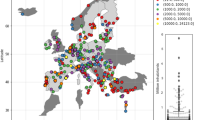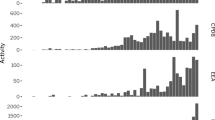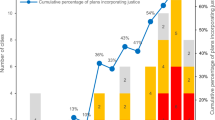Abstract
The use of increasingly large and diverse datasets to guide urban climate action has implications for how, and by whom, local governments are held accountable. This Review focuses on emerging dynamics of accountability in data-driven urban climate change governance. Current understandings of the implications for accountability are examined based on three common rationales for prioritizing data-driven decision-making: standardization, transparency and capacity building. We conclude that the trend toward data-driven urban climate governance can incentivize city governments to prioritize narrowed metrics and external interests, inhibiting the broader transformations required to realize climate change goals. We offer priorities for research at the intersection of data-driven climate governance and the accountability of city governments.
This is a preview of subscription content, access via your institution
Access options
Access Nature and 54 other Nature Portfolio journals
Get Nature+, our best-value online-access subscription
$29.99 / 30 days
cancel any time
Subscribe to this journal
Receive 12 print issues and online access
$209.00 per year
only $17.42 per issue
Buy this article
- Purchase on SpringerLink
- Instant access to full article PDF
Prices may be subject to local taxes which are calculated during checkout
Similar content being viewed by others
References
Kluvers, R. & Tippett, J. Mechanisms of accountability in local government: an exploratory study. Int. J. Bus. Manag. 5, 46 (2010).
Day, P. & Klein, R. The regulation of nursing homes: a comparative perspective. Milbank Q. 65, 303–347 (1987).
Dubnick, M. J. & Yang, K. in The State of Public Administration: Issues, Challenges, and Opportunities 171–186 (M.E. Sharpe, 1998).
Lerner, J. S. & Tetlock, P. E. Accounting for the effects of accountability. Psychol. Bull. 125, 255 (1999).
Bovens, M. Analysing and assessing accountability: a conceptual framework 1. Eur. Law J. 13, 447–468 (2007).
Patterson, J. et al. Political feasibility of 1.5C societal transformations: the role of social justice. Curr. Opin. Environ. Sustain. 31, 1–9 (2018).
Hughes, S. & Hoffmann, M. Just urban transitions: toward a research agenda. Wiley Interdiscip. Rev. Clim. Change 11, e640 (2020).
Trounstine, J. Representation and accountability in cities. Annu. Rev. Polit. Sci. 13, 407–423 (2010).
Kim, S. & Schachter, H. L. Citizen participation in the budget process and local government accountability: case studies of organizational learning from the United States and South Korea. Public Perform. Manag. Rev. 36, 456–471 (2013).
Meijer, A. J. Digitization and political accountability in the USA and the Netherlands: convergence or reproduction of differences? Electron. J. E-Gov. E 5, 213–224 (2007).
Robin, E. & Acuto, M. Global urban policy and the geopolitics of urban data. Polit. Geogr. 66, 76–87 (2018).
Acuto, M. Global science for city policy. Science 359, 165–166 (2018).
Kitchin, R., Lauriault, T. P. & McArdle, G. Knowing and governing cities through urban indicators, city benchmarking and real-time dashboards. Reg. Stud. Reg. Sci. 2, 6–28 (2015).
Batty, M. Big data and the city. Built Environ. 42, 321–337 (2016).
Goldsmith, S. & Crawford, S. The Responsive City: Engaging Communities Through Data-Smart Governance (Jossey-Bass, 2014).
Cox, M., Brown, M. A. & Sun, X. Energy benchmarking of commercial buildings: a low-cost pathway toward urban sustainability. Environ. Res. Lett. 8, 035018 (2013).
Bass, G. D. Big data and government accountability: an agenda for the future. ISJLP 11, 13 (2015).
Bannister, F. & Connolly, R. Trust and transformational government: a proposed framework for research. Gov. Inf. Q. 28, 137–147 (2011).
Zuiderwijk, A. & Janssen, M. Open data policies, their implementation and impact: a framework for comparison. Gov. Inf. Q. 31, 17–29 (2014).
Ruijer, E. & Meijer, A. Open government data as an innovation process: lessons from a living lab experiment. Public Perform. Manag. Rev. 43, 613–635 (2020).
Merry, S. E. & Conley, J. M. Measuring the world: indicators, human rights, and global governance. Curr. Anthropol. 52(Suppl.), 83–95 (2011).
Davis, K. E., Kingsbury, B. & Merry, S. E. in The Quiet Power of Indicators: Measuring Governance, Corruption, and Rule of Law 1–24 (Cambridge Univ. Press, 2015).
Kuzemko, C., Mitchell, C., Lockwood, M. & Hoggett, R. Policies, politics and demand side innovations: the untold story of Germany’s energy transition. Energy Res. Soc. Sci. 28, 58–67 (2017).
Mayernik, M. S. Open data: accountability and transparency. Big Data Soc. 4, 2053951717718853 (2017).
Marvin, S., Luque-Ayala, A. & McFarlane, C. Smart Urbanism: Utopian Vision or False Dawn? (Routledge, 2016).
Schmidt, V. A. Democracy and legitimacy in the European Union revisited: input, output and ‘throughput’. Polit. Stud. 61, 2–22 (2013).
Corfee-Morlot, J., Kamal-Chaoui, L., Robert, A. & Teasdale, P.-J. Cities, Climate Change and Multilevel Governance (OECD Publishing, 2009).
Page, E. A. The hidden costs of carbon commodification: emissions trading, political legitimacy and procedural justice. Democratization 19, 932–950 (2012).
Bader, N. & Bleischwitz, R. Measuring urban greenhouse gas emissions: the challenge of comparability. SAPIENS 2, 3 (2009).
Hsu, A., Cheng, Y., Weinfurter, A., Xu, K. & Yick, C. Understanding NAZCA: Challenges and Future of the World’s Largest Voluntary Climate Action Platform (Yale University, 2016); https://datadrivenlab.org/wp-content/uploads/2017/10/Yale_ADEME_Report_.pdf
Höhler, S. & Ziegler, R. Nature’s accountability: stocks and stories. Sci. Cult. 19, 417–430 (2010).
Daas, P. J., Puts, M. J., Buelens, B. & van den Hurk, P. A. Big data as a source for official statistics. J. Off. Stat. 31, 249–262 (2015).
Kuzemko, C. Climate change benchmarking: constructing a sustainable future? Rev. Int. Stud. 41, 969 (2015).
Olivier, J. G. J., Janssens-Maenhout, G., Muntean, M. & Peters, J. A. H. W. Trends in Global CO2 Emissions (PBL Netherlands Environmental Assessment Agency, 2016).
Wachsmuth, D., Cohen, D. A. & Angelo, H. Expand the frontiers of urban sustainability. Nature 536, 391–393 (2016).
Madsen, A. K. Data in the smart city: how incongruent frames challenge the transition from ideal to practice. Big Data Soc. 5, 2053951718802321 (2018).
Giest, S. Big data analytics for mitigating carbon emissions in smart cities: opportunities and challenges. Eur. Plan. Stud. 25, 941–957 (2017).
Broome, A. & Quirk, J. Governing the world at a distance: the practice of global benchmarking. Rev. Int. Stud. 41, 819 (2015).
Chan, S. & Pattberg, P. Private rule-making and the politics of accountability: analyzing global forest governance. Glob. Environ. Polit. 8, 103–121 (2008).
Gordon, D. J. Politics of accountability in networked urban climate governance. Glob. Environ. Polit. 16, 82–100 (2016).
Martens, P. & Ting Chang, C. (eds) The Social and Behavioural Aspects of Climate Change: Linking Vulnerability, Adaptation, and Mitigation (Greenleaf Publishing, Ltd., 2010).
Oikonomou, V., Flamos, A. & Grafakos, S. Is blending of energy and climate policy instruments always desirable? Energy Policy 38, 4186–4195 (2010).
Kramarz, T. & Park, S. Accountability in global environmental governance: a meaningful tool for action? Glob. Environ. Polit. 16, 1–21 (2016).
van Kersbergen, K. & van Waarden, F. ‘Governance’ as a bridge between disciplines: cross-disciplinary inspiration regarding shifts in governance and problems of governability, accountability and legitimacy. Eur. J. Polit. Res. 43, 143–171 (2004).
Shelton, T. The urban geographical imagination in the age of big data. Big Data Soc. 4, 2053951716665129 (2017).
Widerberg, O. & Pattberg, P. Accountability challenges in the transnational regime complex for climate change. Rev. Policy Res. 34, 68–87 (2017).
Howlett, M. Policy analytical capacity and evidence-based policy-making: lessons from Canada. Can. Public Adm. 52, 153–175 (2009).
Nutley, S. M., Walter, I. & Davies, H. T. O. Using Evidence: How Research Can Inform Public Services (The Policy Press, 2007).
Pawson, R. Evidence-based Policy: A Realist Perspective (SAGE, 2006).
Sanderson, I. Evaluation, policy learning and evidence-based policy making. Public Adm. 80, 1–22 (2002).
Romero-Lankao, P., Hughes, S., Rosas-Huerta, A., Borquez, R. & Gnatz, D. Urban institutional response capacity for climate change: an examination of construction and pathways in Mexico City and Santiago. Environ. Plan. C Gov. Policy 31, 785–805 (2013).
Tomer, A. & Shivaram, R. Modernizing Government’s Approach to Transportation and Land Use Data: Challenges and Opportunities (Brookings, 2017); https://www.brookings.edu/research/modernizing-approach-to-data/
Hughes, S. Repowering Cities: Governing Climate Change Mitigation in New York City, Los Angeles, and Toronto (Cornell Univ. Press, 2019).
Kitchin, R. The real-time city? Big data and smart urbanism. GeoJournal 79, 1–14 (2014).
Jones, C. M. & Kammen, D. M. Quantifying carbon footprint reduction opportunities for US households and communities. Environ. Sci. Technol. 45, 4088–4095 (2011).
Jones, C. M. & Kammen, D. M. Spatial distribution of U.S. household carbon footprints reveals suburbanization undermines greenhouse gas benefits of urban population density. Environ. Sci. Technol. 48, 895–902 (2014).
Fuller, S. Configuring climate responsibility in the city: carbon footprints and climate justice in Hong Kong. Area 49, 519–525 (2017).
Rice, J. L. An urban political ecology of climate change governance. Geogr. Compass 8, 381–394 (2014).
Hansen, H. K. & Porter, T. What do big data do in global governance? Glob. Gov. Rev. Multilateralism Int. Organ. 23, 31–42 (2017).
Stirling, A. in The Politics of Green Transformations (eds Scoones, I. et al.) 54–67 (Routledge, 2015).
Ebi, K. L., Boyer, C., Bowen, K. J., Frumkin, H. & Hess, J. Monitoring and evaluation indicators for climate change-related health impacts, risks, adaptation, and resilience. Int. J. Environ. Res. Public Health 15, 1943 (2018).
Hughes, S. Principles, drivers, and policy tools for just climate change adaptation in legacy cities. Environ. Sci. Policy 111, 35–41 (2020).
Author information
Authors and Affiliations
Contributions
S.H., S.G. and L.T. contributed to the project planning, analysis, writing and editing of this manuscript.
Corresponding author
Ethics declarations
Competing interests
The authors declare no competing interests.
Additional information
Peer review information Nature Climate Change thanks David Gordon and Stephan Grimmelikhuijsen for their contribution to the peer review of this work.
Publisher’s note Springer Nature remains neutral with regard to jurisdictional claims in published maps and institutional affiliations.
Rights and permissions
About this article
Cite this article
Hughes, S., Giest, S. & Tozer, L. Accountability and data-driven urban climate governance. Nat. Clim. Chang. 10, 1085–1090 (2020). https://doi.org/10.1038/s41558-020-00953-z
Received:
Accepted:
Published:
Issue Date:
DOI: https://doi.org/10.1038/s41558-020-00953-z
This article is cited by
-
Operationalizing climate justice in the implementation of Boston’s Building Performance Standard
Nature Cities (2024)
-
A disconnect in science and practitioner perspectives on heat mitigation
npj Urban Sustainability (2024)
-
Empirical analysis of the role of the environmental accountability system in energy conservation and emission reduction in China
Scientific Reports (2022)
-
What does neighbourhood climate action look like? A scoping literature review
Climate Action (2022)
-
Ecosystem Benefits Provision of Green Stormwater Infrastructure in Chinese Sponge Cities
Environmental Management (2022)



